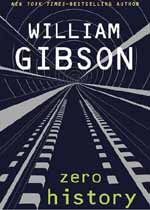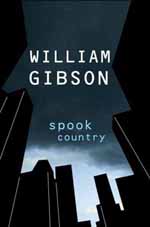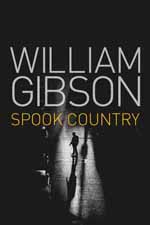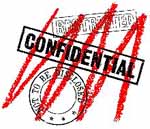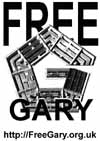The Los Angeles Times (Sunday edition), another major mainstream publication, which will reach a large (United States) readership, has a review of Spook Country, which is again a positive one.
When will the critical mass of US mainstream media reviews be reached, which may wake up the United Kingdom media, who seem to be ignoring the book, despite its slightly earlier publication here ? Until Spook Country is "mentioned in the media", it will not be made available widely in bookshops outside the major cities, especially the large retail chains like W.H.Smiths or Waterstones.
The reviewer Ed Park (formerly a literary editor at New York's "Village Voice" until it got taken over by The New York Times last year) seeks to draw comparisons with a couple of American novels, with which I am not familiar (are you ?) namely: Thomas Pynchon's The Crying of Lot 49, and Willam Gaddis's The Recognitions
Luckily, these days a few seconds, via a world wide web search engine, is sufficient to find decent articles about these two books, something which was impossible when they were written.
Ed Park also alludes to to William Gibson's previous novel Pattern Recognition, concentrating on apophenia and, presumably, the William Gibson discussion board thread on the name "Hubertus Bigend".
'Spook Country,' a novel by William Gibson
Technology and consumerism mingle and turn monstrous as a young journalist pursues an elusive lead for a story.
By Ed Park
August 5, 2007
N.B. may contain plot and character teaser / "spoiler" information, depending on how many reviews (or how much of the novel) you have read so far:
.
Spook CountryA Novel
William Gibson
G.P. Putnam's Sons:
374 pp., $25.95
CONSIDER this frank greeting in William Gibson's "Spook Country": "I've just checked the number of your Google hits, and read your Wikipedia entry." This is what translates as fame today: a foothold in the ether, an identity composed by a faceless committee of unknown size. Gibson famously coined the term "cyberspace" in his reality-crashing, paradigm-shifting 1984 debut, "Neuromancer," and his conception of its "consensual hallucination" rings truer now, more than two decades later, as we pursue terminally framed existences teeming with hyperlinks and blogs, worlds of Warcraft and second lives.
The Googlee in question is Hollis Henry, singer in a defunct 1990s cult band, the Curfew. She's now a journalist working on a story for a shadowy magazine, Node, that hasn't published an issue yet. (It's variously and hilariously described as a would-be Wired, generating sub-rosa buzz by its very anti-buzz.) Cults, shadows, secrets: in other words, Gibson country.
Hollis is a character in the mold of Cayce Pollard, the logo-allergic "coolhunter" of Gibson's 2003 novel "Pattern Recognition." Both of these appealing heroines -- curious, charismatic and essentially chaste -- share DNA with Oedipa Maas in Thomas Pynchon's "The Crying of Lot 49," all of them women on the verge of nerve-wracking conspiracies in which, Gibson writes, "possession of information amounts to involvement."
The ostensible subject of an article that Hollis is writing is Alberto Corrales, a holographic artist who painstakingly constructs virtual-reality celebrity death scenes at their actual locations. Hollis' research takes her into unexpected places, and suddenly she finds herself plowing the dark in search of a nebulous shipping container. Corrales explains to Hollis how his project suggests that "the world we walk around in would be channels" if everyone had their own VR helmets, tuning in only to what they wanted to see. ("We're all doing VR, every time we look at a screen," he says -- Gibson has axioms to burn.)
The narrative of "Spook Country" overlays two other frequencies -- two other protagonists -- and the connections among all three are initially unclear. Milgrim is a code cracker and addict who is dependent on Brown, a violent man who might be with the CIA; their quarry, Tito, is Cuban-Chinese ("indeterminately ethnic") and a preternaturally limber young man whose family has roots in counterfeiting and intelligence: His actions are guided by the spirits of Santería. Needless to say, everyone's questing for the enigmatic shipping container, wherever it might be.
"Spook Country" is an oblique sequel to "Pattern Recognition," or, better yet, the book is its antic anagram, expanding themes and re-upping a few characters. Here again Gibson gives us a present (more precisely, early 2006 -- Tower Records lives!) in which the skies are the color of steel, no matter the city, and the outlines of a chaotic future can be discerned. Sentence for sentence, few authors equal Gibson's gift for the terse yet poetic description, the quotable simile -- people and products are nailed down with a beautiful precision approximating the platonic ideal of the catalog. An ex-bandmate now wears a " 'Bladerunner' soccer-mom look," a "Bluetoothed bouncer"
Those two phrases stood out for me as well.
patrols a bar and, when Gibson registers a "delirious surge of graffiti, a sort of street-fractal Hokusai wave," the phrasing is itself a delirious surge of pleasure-center prose.Still, mystery abounds, myriad paranoias pulsating underneath the immaculate surfaces. Hollis sometimes visualizes a "Mongolian Death Worm" -- the "mascot" of her anxiety -- burrowing beneath the dunes of her consciousness, a nod to the amplified annelids of Frank Herbert's "Dune."
I think that it is the description of the Mongolian Death Worm in WikiPedia,a mythological creature from the real world Gobi desert, which is more likely to have influenced William Gibson rather more than than the "sandworms described in Dune which are not really nighmares.
Gibson continues to unofficially tout all things Apple, but in "Spook Country" this product placement has a twist:
It will be interesting to ask William Gibson about brand names in his books, and whether he has actually been offered real Hollywood / video game style "product placement" sponsorship or endorsement deals now that he is writing so close to the present day time period ?
iPods are used to ferry deceptive data, and at one point Tito imagines what would happen if you could "crack its virginal white case like a nut, and then draw forth something utterly peculiar, utterly dire, and somehow terrible in its contemporaneity." Even the sleekest products can host demons, crackling with as much potential malice as the anonymous-looking container at the heart of this story.Hollis learns that Node magazine is a project of Hubertus Bigend, the zeitgeist-infiltrating force behind Blue Ant, a Belgian-based advertising enterprise that calls itself the "first viral agency." "He doesn't want you to have heard of him," one of Bigend's minions tells Hollis. He operates on the principle that secrets "are the very root of cool." The irony is that readers of "Pattern Recognition" have already heard of him, and there's something deliciously sinister in the fact that the antihero forms the most obvious link between Gibson's two most recent novels. Spoiler alert: In "Pattern Recognition," Bigend funded Cayce's search for the source of haunting film fragments appearing on the Web; here we learn that Bigend successfully harnessed that sublime technology (whose online scholars represented "the first true freemasonry of the 21st century") to sell shoes.
Googling "Hubertus Bigend" in real life leads you to a discussion board where Gibsonites muse, a bit futilely, on the significance of his somewhat anatomical name.
The real fun will be had with the Wikipedia entry for "Hubertus Bigend", which may , or may not self-referentially and recursively have to quote the fictional Wikipedia entry which William Gibson has written into Spook Country
The Wikipedia "Spook Country" page edit history RSS feed or Atom feed or the equivalents for the Hubertus Bigend page if it ever appears, may be worth subscribing to.
This reviewer wonders whether his odd moniker is an allusion, or at least a fortuitous parallel, to a minor character in another labyrinthine book concerned with art, imitation and money by another William G. -- William Gaddis, in his novel "The Recognitions" (1955). When Bigend explains his philosophy to Hollis by telling her, "Everything is potential," she responds: "Everything is potential [bull]." In Gaddis' book, the same is true as the odious Recktall Brown collaborates with an art critic dealing in expensive forgeries. For all of Gibson's lavish products, he's given his main moneyman a name that evokes the vulgar. Anything that can be sold instantly loses its cachet, a point brought home again when Bigend suggests to Hollis' ex-bandmate Inchmale that they sell a Curfew song for a Chinese car commercial.Any reader of Gibson understands that to follow the flow of, say, his novel "Neuromancer," with its vigorous, carpet-pulling tempos, you have to read the landscape for clues. The titular character (or cipher) speaks of the "patterns sometimes you imagined you could detect in the dance of the street. Those patterns are real." Does this mean that, with Gaddis in mind, the title of Gibson's "Pattern Recognition" is really a homage to "The Recognitions"? The title -- the concept of that novel -- drives the reader to enter into a state of apophenia, which is defined by Cayce's father, Win, as "the spontaneous perception of connections and meaningfulness in unrelated things," a gift Cayce also has. Should we pay special attention, then, to the fact that a late-arriving adventurer in "Spook Country" is described as resembling William S. Burroughs -- as is Win (who'd gone missing after Sept. 11) in "Pattern Recognition"?
More apophenia: In "Spook Country," we learn that Inchmale has retired to Buenos Aires. This year, New Directions published a 45th-anniversary edition of Jorge Luis Borges' "Labyrinths" with an introduction by Gibson, in which he calls the Buenos Aires native's book a "singular" milestone in his reading life. It's a collection in which books are the seeds for nightmares and vice versa, and every passage is lined with mirrors. (Perhaps the most potent Web prophecy before "Neuromancer" is Borges' 1949 story "The Aleph.")
WIkipedia article on The Aleph
Despite its thriller trappings, "Spook Country" is a puzzle palace of bewitching proportions and stubborn echoes. Hollis' band was the Curfew, which means it's time for you to come inside. •
